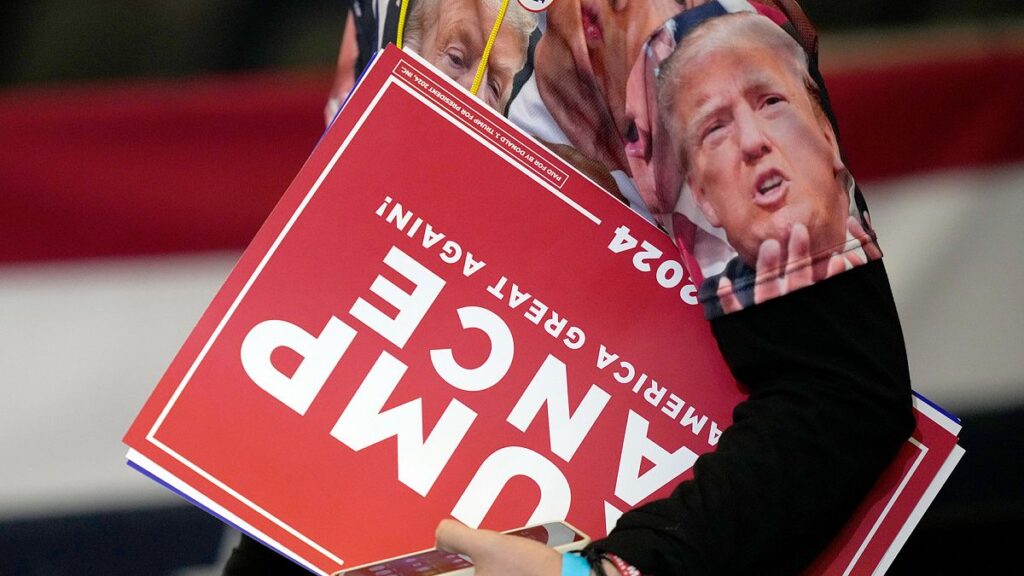Kamala Harris and Donald Trump are targeting key states with large Arab American and Jewish populations as the impact of the conflict shapes their campaigns and could influence the outcome of the election.
With two weeks to go before the election, the ongoing crisis in the Middle East has become a focal point in the race for the presidency of the United States.
Vice President Kamala Harris and former President Donald Trump are each trying to address the complexities of the conflict while fighting for crucial votes in key states like Michigan and Pennsylvania, which have large Arab-American populations and Jews.
Kamala Harris is walking a difficult line, expressing strong support for Israel while condemning civilian casualties in Gaza and Lebanon.
This balancing act has drawn mixed reactions, including criticism from some who misinterpreted remarks she made during a recent exchange with a pro-Palestinian protester, saying she was d agreement with the allegations of “genocide” Israeli.
Kamala Harris’ campaign quickly clarified that her comments were about the general humanitarian situation in the Gaza Strip.
The dynamic reversed a day earlier, when the vice president said that “the first and most tragic of stories” of the conflict was the Hamas attack on October 7, which resulted in the deaths of approximately 1,200 Israelis.
The statement upset those who felt it did not adequately take into account the deaths of more than 42,000 Palestinians in Gaza, sparking further criticism of her position.
Donald Trump, meanwhile, took a tougher approach, saying the conflict would not have happened on his watch and promising to end it if elected.
In recent interviews with Middle Eastern television channels and in messages published on his social network Truth Social, the Republican candidate has asserted that a Harris administration would worsen the conflict, even raising the risk of a third world war .
“If Kamala gets four more years, the Middle East will spend the next four decades burning, and your children will go to war, maybe even World War III, which will never happen under President Donald J. Trump in charge”posted the former Republican president.
Will Harris and Trump manage to overcome the crisis in the Middle East?
As Kamala Harris attempts to align her message with President Joe Biden’s policies while striking a more empathetic tone, some in the Democratic Party are expressing frustration with Trump’s unpredictable but bold foreign policy statements, which have drawn attention without being subject to in-depth examination.
Analysts see this contrast as a potential challenge for the Democratic candidate in the final days of the campaign.
An AP-NORC poll indicates that neither candidate holds a significant advantage on Middle East policy, with voters divided over who would handle the situation best.
However, Kamala Harris faces some discontent within her party. Only two-thirds of Democrats believe she would be the best candidate to manage the conflict, while 8 in 10 Republicans support Donald Trump on this issue.
In Michigan, home to the largest Arab American community in the United States, the impact of the war is deeply personal. The community called for a ceasefire and criticized the Biden administration for its stance on the conflict.
If Kamala Harris initially offered hope for change, many believe that her policies have not deviated sufficiently from those of Joe Biden.
Although both parties largely support Israel, most of the frustrations and criticism have been directed at Joe Biden.
When Kamala Harris launched her campaign, Arab-American leaders were initially hopeful. However, this hope quickly faded, as the community felt that it had not sufficiently distanced itself from Joe Biden’s policies.
Meanwhile, ads funded by Future Coalition PAC, a group backed by Elon Musk, target Michigan’s Arab-American communities and Pennsylvania’s Jewish voters, each emphasizing different aspects of the vice president’s position towards Israel.
Morgan Finkelstein, spokesperson for Kamala Harris, cast Donald Trump’s approach to the Middle East as part of a broader signal that “an uncontrolled and unbalanced Trump is simply too dangerous”.
“It would return us to the chaotic, solitary approach that has made the world less safe, and it would weaken America,” Morgan Finkelstein said.


